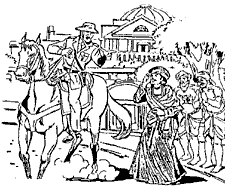|
The early Europeans who came to India in search of fortunes were overawed by "Oriental Splendour" and meekly waited upon Mughal emperors, while seeking trade concessions. When the British gained a firm foothold in Bengal, scholars like William Jones studied Sanskrit works and discovered the depth of Indian culture which they came to admire. However, as British power increased, the British became contemptuous of the conquered people. On his arrival in India, Governor-General Marquess of Hastings credited the people of India with 'no higher intellect than a dog and an elephant or a monkey might be supposed capable of attaining'.
Prof T.G.P. Spear noted with concern that "the attitude of the average Englishman changed from one of disapproval …into one of contempt for an inferior and conquered people." This attitude of Englishmen was due to a sense of racial superiority. "A cherished conviction which was shared by every Englishman in India, from the highest to the lowest," wrote Wilfred Blunt, "was that he belongs to the race whom God has destined to govern and subdue." This superiority complex was the extension of the feeling of superiority of the white race over the black which swept the whole of Europe during the nineteenth century.
This attitude was reflected in the way the British officials behaved in India causing untold misery to the people.
Like the black populations of Africa and the southern states of the USA, Indians had to put up with insult and injury at the hands of the whites.
Wilfred Blunt recalls an incident in Patna when he was being seen off by Nawab Vilayet Ali Khan accompanied by 30 leading citizens. "There was neither obstruction, nor noise, nor crowding," writes Blunt. "But the presence of 'natives' on the platform became suddenly distasteful to an English passenger in the adjoining compartment. Thrusting his head out of the window he began to abuse them and bid them off, and when they did not move, struck at them with his stick and threatened the old Nawab especially with it if he came within his reach. …the railway officials and police treated it as a matter of small importance, and did their best to screen the offender."
When Blunt narrated the Patna incident to his Indian friends in Bombay he was informed that every native in Bombay had been subjected to such incidents! Mr. Mandalik, a government pleader told Blunt that on one occasion he was thrown out of the railway carriage between Benaras and Allahabad because a white passenger objected to an Indian sharing his compartment.
Later Blunt received letters from his friends in Patna. "I beg to assure you," one of them wrote, "that the incident was not (an only) one of its kind, but such treatment is becoming general… Alas! we are hated for no other reason but because we have a dark colour, because we put on a national dress and because we are a conquered race ... Allow me to say that it will be difficult for England to hold India long if such a state of feeling is allowed to progress without any check."
|
Salaam, Sahib
 January 1, 1809. At about 4 o'clock Raja Rammohan Roy was passing through Bhagalpur. The Raja was being carried in a palanquin. As the door of the palanquin was shut, the Raja did not see Sir Hamilton, the District Collector passing by. The Collector was furious at being ignored by a native. He shouted at the palanquin bearers. When the Raja got out of the palanquin to see what the commotion was about, he was greeted by the choicest of abuses. The Raja had to pacify the irate Collector by saluting the official as demanded, and tender an apology.
January 1, 1809. At about 4 o'clock Raja Rammohan Roy was passing through Bhagalpur. The Raja was being carried in a palanquin. As the door of the palanquin was shut, the Raja did not see Sir Hamilton, the District Collector passing by. The Collector was furious at being ignored by a native. He shouted at the palanquin bearers. When the Raja got out of the palanquin to see what the commotion was about, he was greeted by the choicest of abuses. The Raja had to pacify the irate Collector by saluting the official as demanded, and tender an apology.
On his return to Calcutta the Raja sent a petition to Lord Minto the Governor-General protesting against the rude behaviour of the Collector.
Routledge in his book "English Rule and Native Opinion in India," refers to Englishmen pushing through crowds of people as through a herd of cattle.
Sir Henry Cotton writes: "It is but too common an outrage to assault respectable residents of the country because when passing on the road they have not dismounted from their horses in token of their inferiority. I have known a case in which an unfortunate old man died from the effects of blows so received."
|
|
| 
